We Tried 4 LogiNext Mile Alternatives. Here's What We Found Out
We’ve analysed LogiNext Mile and its competitors, resulting in a list of the 4 best LogiNext Mile alternatives that will help you find the right...
Home > Blog > 4 Best Last-Mile Delivery Software Tools To Use (In-Depth Comparison)
ReviewsThe best last-mile delivery software compared. See how eLogii, LoxiNext, Onfleet, and Routific stack up in terms of features, price, and use cases.
Looking for a last-mile delivery software tool to streamline your operations and give you a customer service edge – but don’t know how to choose?
Then please allow us to be of service! Here are four of the best last-mile delivery software options – with detailed breakdowns of their features and our verdicts on what kind of businesses each would suit best.
ON THIS PAGE:
“Last-mile” delivery is the final step of the delivery process – the process of getting products from the distribution center to the customer.
The last-mile stage accounts for 53% of most businesses’ logistics costs. The quality of service provided here also has a massive impact on customer satisfaction: 84% of shoppers say they would be unlikely to buy again from a business that gave them a poor last-mile delivery experience.

Source: Freepik.com
So the stakes are high: choosing the best last-mile delivery software for your business has the potential to save you a huge amount of money.
For example, one international study found that 5.6% of all UK deliveries failed and that each one cost an average of £14.33. How much would halving that failure rate save your business?
Add fuel costs, driver wages, loading times, etc., to the equation, and you can see why smart businesses are choosing to run their last-mile delivery operations with dedicated software rather than leaving anything to chance.
We’re going to score each app against eight criteria:
Of course, the highest score doesn’t mean that a tool is necessarily the best last-mile delivery software for your needs. You have to balance that score against price and the use cases each one supports – so we’ve provided as much pricing data as we can, along with a final “in a nutshell” verdict.
eLogii lets despatchers create highly efficient delivery routes with just a few clicks – taking into account a whole range of extra factors, like traffic conditions, truck restrictions, and multi-day routing for long-distance deliveries.
Drivers can use it in conjunction with Google Maps, Waze, and Here Maps – and their location is tracked in real-time via GPS.
Not only does eLogii enable email and SMS communications with customers, updating them on live ETAs, but it also allows task failure workflows to be automated – cutting the high associated costs.
It supports every major type of POD and even allows you to define custom confirmation conditions (e.g., proof of age verification).
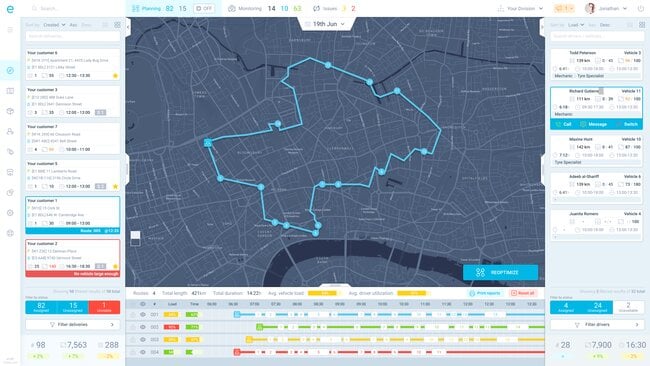
Where eLogii outclasses the competition is in the range of options and conditions it supports. For example:
As a relatively new platform, eLogii is built with ease of use for non-specialists in mind and with a state-of-the-art API and webhooks that allow it to be integrated into any tech stack with ease. Both of these factors are often barriers for older platforms that need to adapt their offerings.
eLogii provides a custom price to each customer based on their specific needs after a free consultation with a product expert. They will customize the platform to your needs, and you can then test it out during a pilot period if necessary.
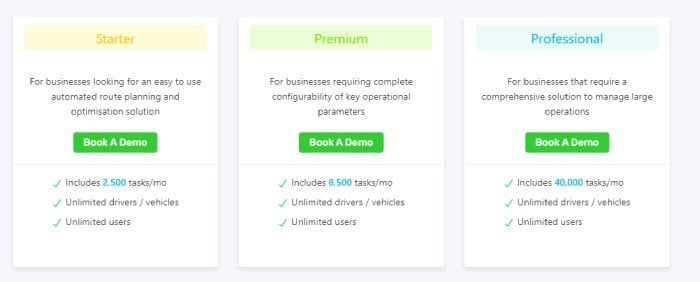
They do provide some information about packages, though, as per the image above – showing that pricing is based primarily on tasks per month. A Starter can expect to pay around $359 per month for 2,500 tasks, which includes unlimited users and all the most important features. But some of eLogii’s most advanced functionality is restricted to the higher tiers: see this article for a detailed comparison.
Ananas, a regional platform for online commerce, faced major challenges with their delivery management system. Their setup caused delays, disorganization, and poor communication, impacting efficiency and client satisfaction.
Here’s how eLogii helped:
Challange: Ananas struggled with inefficiencies and missed deadlines due to their disorganized project management system.
Solution: eLogii introduced a tailored project management tool featuring real-time updates, integrated communication, and streamlined task management.
Implementation: eLogii provided thorough training and support to ensure Ananas’s team could effectively use the new system.
Results:
50% Reduction in "Where's My Order?" Calls: Clients could track their orders in real-time, reducing status inquiries by half.
Double-Digit Operational Savings: Ananas achieved significant cost savings within months of adopting the new system.
Unparalleled Customer Satisfaction: Enhanced live information and tracking led to exceptional client satisfaction.
25% Reduction in Internal Calls Per Order: Improved project visibility and communication cut internal status calls by 25%.
#2 eLogii Use Case: JClub
JClub, a company that helps you book gym and fitness classes, was having issues with their old scheduling and booking system. It was causing a lot of inefficiencies and headaches for both users and staff.
JClub needed a better solution to handle bookings smoothly and improve the overall experience. That’s where eLogii’s software came in. Here’s what went down:
Results:
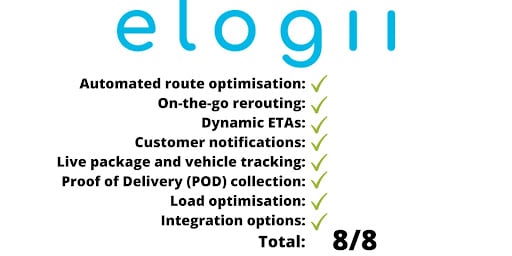
eLogii is the ideal last-mile delivery software for businesses small and large alike – except for really small firms who won’t need all its features and so would be better off with cheaper options.
Not only does it tick all of our best last-mile delivery software boxes, but it’s also extremely easy to use, it allows more customization of route and load parameters than any of the alternatives, and it has a modern, best-of-class API and webhooks, making it easy to plug into any tech stack.
LogiNext Mile is the last-mile delivery platform within LogiNext’s wider logistics software suites. This gives it a few extra capabilities versus the stand-alone alternatives (e.g., odometer reading tracking via the TrackNext app).
In terms of core functionalities, LogiNext Mile ticks nearly all the boxes:
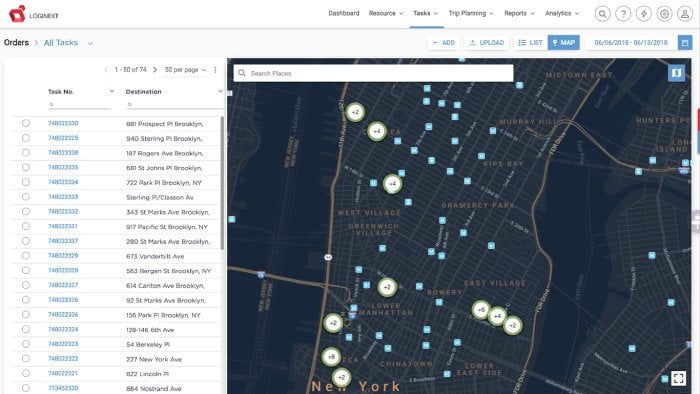
It does not provide the ability to tailor the choice of packages to specific vehicles and drivers automatically. You would have to do this manually, which can be very time-consuming with large vehicles. So we’ve knocked off a mark there compared to eLogii, which provides a lot of functionality to ensure that the delivery routes generated can be optimized against a wide range of parameters.
LogiNext Mile is strong on analytics: it can generate a lot of reports on driver performance, payments, delays, failed attempts, etc. – although advanced options are only available on the Enterprise package.
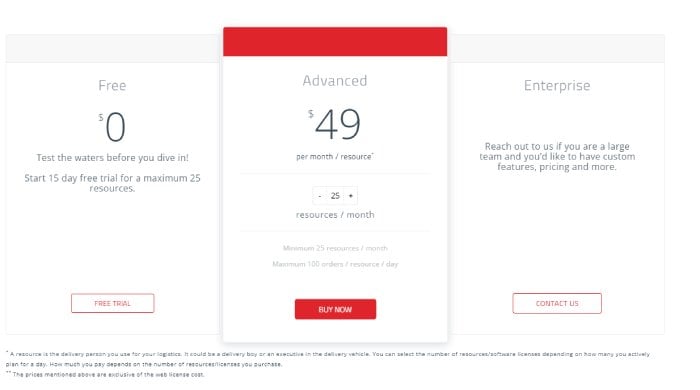
This is really quite hard to say.
Their pricing page says $49 per month per resource for the Advanced package – a resource being one vehicle or driver. And check out that (!) there is a “web license cost” not included in that price.
As shown above, the smallest paid-for plan available is 25 resources per month – giving an entry price of $1,225 per month, plus whatever a web license costs.
But further down on the pricing page, it says you can have as few as five resources on a plan. Not only that, LogiNext gives different names to the three packages in the very next table (Basic, Premium, and Advanced, presumably corresponding to Free, Advanced (!), and Enterprise).
Confused? Yeah, us too.
LogiNext Mile has a lot of great features, making it one of the most powerful last-mile delivery software tools on the market. But it comes with a price tag to match, which will put it out of reach for most small businesses.
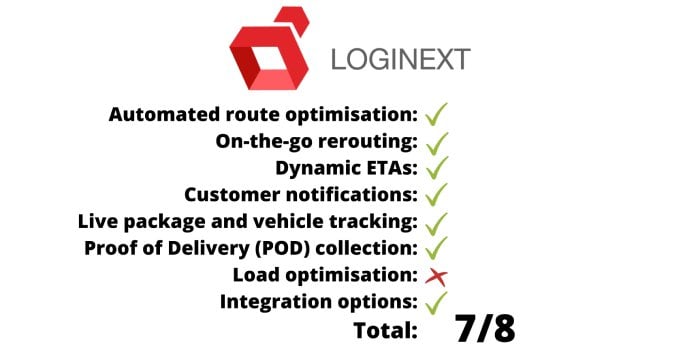
Onfleet has a clean, simple UI and a simple pricing model which makes it very attractive to smaller firms or newcomers to this space.
In terms of features, Onfleet scores highly:
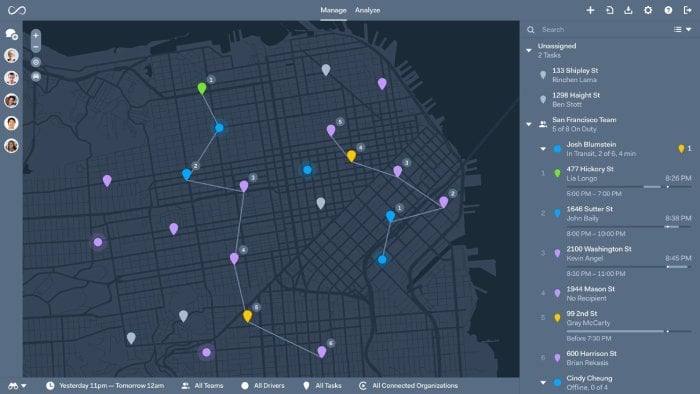
Onfleet’s driver app offers navigation through Google Maps, Waze, or Apple Maps – plus a lot of other functionality, which makes the omission of barcode scanning on the Starter and Basic packages an odd choice.
One sign that Onfleet is intended for use by smaller firms is the emphasis put on Zapier integrations. This is great if you don’t have developers who can help you with the API or webhooks.
Nevertheless, Onfleet’s API is robust, well-documented, and easy to work with.
But with fewer variables to play with than eLogii, for example, the scope for developing complex integrations is less extensive. Onfleet does not allow you quite so many detailed conditions around drivers, vehicles, and service levels. It is only responsive to live traffic information in the USA as well.
Finally, quite a few reviews mention glitches in the Onfleet driver and web apps. We haven’t experienced them ourselves, but it’s worth mentioning.
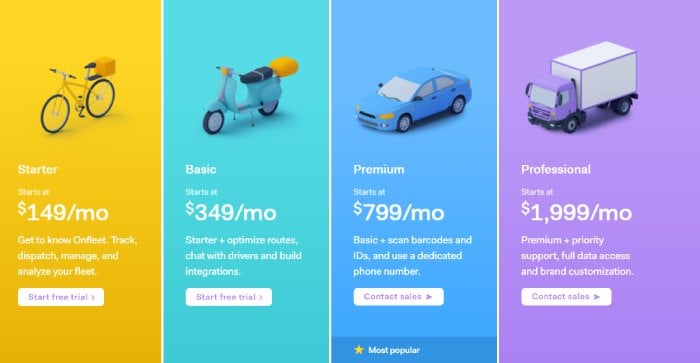
Like eLogii, Onfleet’s packages are priced first and foremost according to the number of “tasks” included per month (one task being one pickup or delivery). You can have as many drivers, vehicles, and admin users as you want, and you pay an extra charge per task over and above your limit.
The Basic package (2,500 tasks) is good for small firms, but it omits barcode scanning and age verification in POD – which limits the types of business it would be suitable for. The Premium package includes those functionalities and 5,000 tasks for $799 per month.
Onfleet explicitly markets itself first and foremost to smaller businesses – and the ability to subcontract other Onfleet organizations is particularly handy in that respect.
It has a great range of features at the higher pricing tiers (the Starter package doesn’t even include automated route optimization, for example).
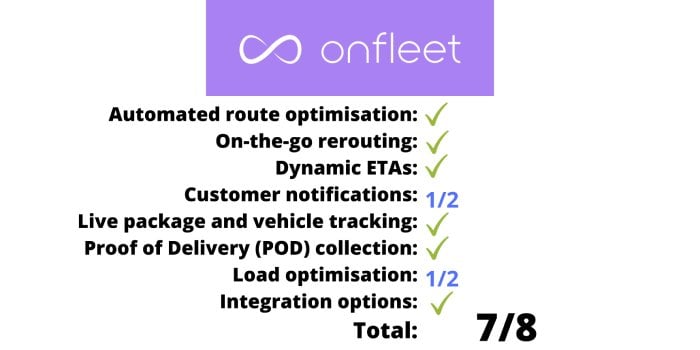
We’ve given Onfleet half a mark for load optimization because, while it allows users to “consider” vehicle type and capacity, it does not give as much scope to customize as eLogii does. And beware of those glitches!
As we’ll soon see, Routific doesn’t have quite the same range of features as our other contenders. It has:
Those factors weigh hard on our verdict about the platform. Without visibility over where vehicles are (Routific only tags them at their most recent delivery point), users simply don’t have the level of control necessary to be able to maximize efficiency and ensure customer satisfaction.
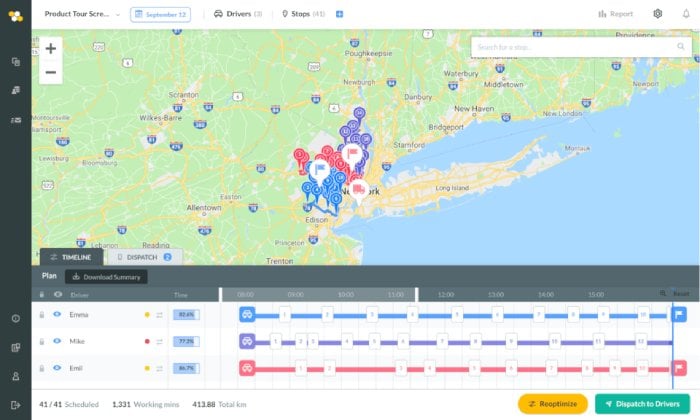
Nevertheless, there are some good reasons to consider Routific if you are running a very small business:
If simplicity is paramount, Routific is a good option. It doesn’t have some of the advanced features that other tools offer (e.g., multi-day scheduling, return-to-depot, support for on-demand delivery), but it’s a solid last-mile delivery software option for delivery businesses that wouldn’t need all the functionality of or be able to afford the other options, and that’s why we’ve included it.
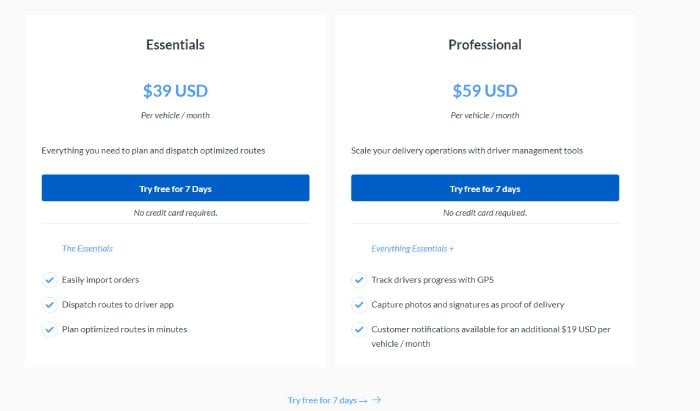
Routific’s Essentials package excludes live delivery tracking and any POD data capture. If you want those critical features, you’ll need to opt for the $59 per month per vehicle Professional package.
Charging per vehicle per month makes Routific a good option for small businesses that operate just a handful of vehicles. But for the 25-vehicle fleet we’ve been looking at, that’s going to cost a hefty $1,425 per month.
Oh, wait! If you want to be able to send email or SMS notifications to customers, that will cost an extra $19 per month per vehicle. That takes the cost for a 25-vehicle business to $1,900 per month.
Routific is good value for small, simple businesses running a few vehicles over familiar delivery routes that are not expecting any major surprises. But:
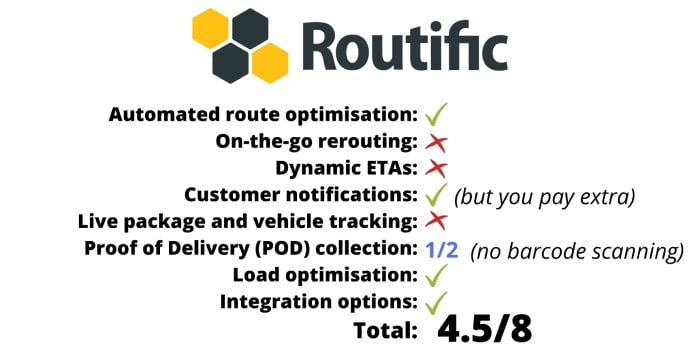
Any business running a delivery operation in 2024 should be using delivery management software. Automated route optimization, live package tracking, and sending out prompt notifications will almost always enable you to lower last-mile delivery costs and boost customer engagement.
But what businesses should use which software tools? Here’s our final recap:

We’ve analysed LogiNext Mile and its competitors, resulting in a list of the 4 best LogiNext Mile alternatives that will help you find the right...
We’re sharing the 10 best delivery scheduling software solutions based on real-world performance, key features, and the types of businesses they suit...
A large-scale analysis of 40K route optimization software reviews. We look at the pains users have with their software and try to offer solutions to...
Be the first to know when new articles are released. eLogii has a market-leading blog and resources centre designed specifically to help business across countless distribution and field-services sub sectors worldwide to succeed with actionable content and tips.
